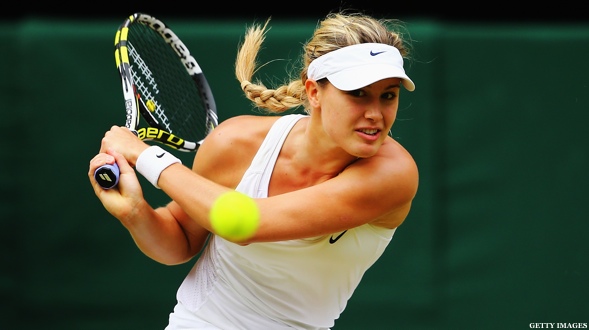By all accounts, Saturday could have been much more profitable for Eugenie Bouchard.
The 20-year-old Canadian lost in straight sets in her first Grand Slam final to Petra Kvitova, missing out on the $3 million Wimbledon winner's check as well as the seven-figure endorsement deals that would have come with it.
Still, Bouchard's star rose to new heights thanks to her stellar performance at the tournament, and the player who was once tagged as the "golden girl of tennis" may be ready to assume her position as the heir to super-marketer Maria Sharapova.
Sharapova is the highest-earning female athlete in the world, thanks in part to her on-court success and marketing savvy. Although Bouchard has a long way to go before she reaches Sharapova in either of those respects, she has been compared to the 27-year-old Russian because of her extraordinary potential.

Bouchard, who currently has sponsorship deals with Nike, Babolat and Coca-Cola, among other companies, has several things working in her favor, according to sports marketing expert Jean Gosselin.
"She's very talented, she's pretty, she has charisma, and she is fully bilingual," Gosselin told the Toronto Sun of the Montreal native. "She's also very good at handling social media."
During her run to the semifinals of the Australian Open, Bouchard nearly doubled her Facebook following (adding 100,000 likes for a total of 243,000) while finishing with a total of 107,000 Twitter followers. Now, just half a year later, she's got more than 700,000 Facebook likes and is nearing 300,000 Twitter followers. She's constantly posting videos and messages, often with a touch of humor.
Think I just raised the bar for press conference attire. #kimono #thankyoujapan pic.twitter.com/p4vQABMo2x
— Eugenie Bouchard (@geniebouchard) June 28, 2014
After being on the cusp of several megadeals, the loss to Kvitova is expected to set Bouchard back in terms of marketing.
What does today mean for Bouchard? Big international sponsorship deals will take more time.
— darren rovell (@darrenrovell) July 5, 2014
But with the way she's been playing recently, it might not be long before Bouchard becomes the next face of the women's game.
“Champions (project) hard work, humility, perseverance, and those are all qualities and attributes other brands like to associate with,” Vijay Setlur, who teaches sports marketing at York University, told The Star. "Once that potential is realized, then more brands will present offers or partnerships because you’re dealing now with an athlete that’s proven."




